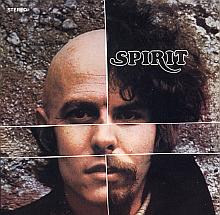Last spring, I borrowed a
hundred or so records from my uncle who used to play in rock and roll bands.
Among them were a couple by Spirit, a band I’d never heard of, probably because
they never quite made it to superstardom. They came close, but not all the way there. In fact, several members of
Spirit came close to making it big before
the band formed in LA in the late 60s. Their drummer, Ed Cassidy, had been in a
band Rising Sons that also included Taj Mahal and Ry Cooder. They’d signed with
Columbia, but Cassidy broke his hand and had to quit, and their album didn’t
come out until 1992. Spirit’s keyboardist, John Locke, was in a band with
Robbie Krieger -- right before Krieger joined The Doors. Bass player Mark Andes
was an original member of Canned Heat, but he left the group right before they
signed with a label. And at the age of 15 their guitarist, Randy California,
played in a band called Jimmy James and the Blue Flames in 1966. When the
band’s leader, whose real last name was Hendrix, left for England to form a new
band called the Experience, he invited Randy to join him, but Randy’s parents
wouldn’t let him go. In fact, Hendrix gave the young guitarist his stage name.
The near-hits kept coming after
the band came together in Los Angeles and started making records. Led Zeppelin
opened for them on their 1968 tour and went on to steal a riff from an
instrumental on their first album and built “Stairway to Heaven” out of it.
They were offered a slot at Woodstock, but their manager advised them to turn it
down because he didn’t think the festival would be a big deal. It wasn’t until
after the original lineup disbanded, in fact, that some of its members
experienced some real success. Andes moved to Boulder and was a founding member
of Firefall and later a member of Heart when the band was banging out number
one hits. Ferguson had a monster hit in 1978 with “Thunder Island” before
becoming a successful composer of movie and TV soundtracks. He wrote the theme
to The Office.
When I asked my uncle why he’d kept
those Spirit albums for all those years, he said, “They were really ahead of
their time.” He had three of their records. Having listened to them all many times, I
have to say I agree; they were ahead of their time. The question is,
what time? I’ve never heard any other band that sounds quite like them. Their
first two, their self-titled debut and The Family That Plays Together, came out a little less than a year
apart in 1968, and they’ve got that influenced-by-the-Beatles sound, especially
in the vocals. But the song arrangements are always shifting in and out of
other sounds – classical, Latin rhythms, folk, blues, jazz. Especially jazz.
Cassidy had drummed with some of the best jazz musicians in the world during
the 50s and early 60s. And keyboardist John Locke clearly had some jazz in his
blood, judging from his epic instrumental “Elijah,” which closes out side two
of their first record. Clocking in at just under 11 minutes, it calls to mind a
Dave Brubeck composition until it breaks down into a free jazz passage with a
fuzzed-out acid-rock guitar solo as its centerpiece and, later, a spacey bass
solo followed by a long drum break.
There was one glaring omission
from my uncle’s collection: Twelve Dreams
of Dr. Sardonicus. I had to buy that one myself after I found out that it’s
widely regarded as their best. When I asked my uncle why he didn’t own that
one, I could hear his cringe through the long distance wires. “Too ‘we’re in
the seventies now,’” he said. It is a
70s record, I’ll grant him that, but I don’t share his disdain. It’s a
black-light-poster-and-lava-lamp classic. It gets quite a bit heavier and more
cosmic in places than their earlier releases (with a bit of pioneering moog
mixed in), but it still has moments of quiet beauty like the earlier releases,
especially on the AOR hit “Nature’s Way” (which my uncle admitted that his band
used to cover).
Of the four, my favorite is The Family That Plays Together. Peaking
at 22 on the Billboard charts, it was their biggest hit. The album has a
brilliant flow to it, drifting seamlessly from the hard-driving hit single “I
Got a Line on You” that opens side one to the dreamy-jazzy “It Shall Be,” to
the hard-driving grooviness of “It’s All the Same,” through layered vocal
harmonies in “Poor Richard” and full orchestra on the gorgeous “Silky Sam,” to
the side’s conclusion, “Darlin’ If,” a love song so beautiful that I would put
it up against any song released in 1968. It’s stunning to know that California
was just 17 years old when he wrote it, because it shows a level of restraint
that usually takes artists years and years of hard work to develop. And so much feeling in the vocals. It’s the
kind of song auto-repeat was made for. It’s the kind of song that superstars
are made from. But the story of Spirit shows that greatness doesn’t always
hinge on artistic genius. Sometimes it’s a matter of luck. And having a manager
smart enough to know a generation-defining festival when he sees one.



No comments:
Post a Comment